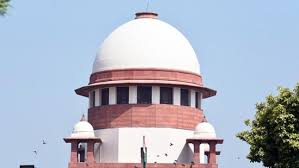The question of issuing interim directions for the effective implementation of the provisions of the Motor Vehicles Act, 1988 (for short, ‘the MV Act’) relating to the grant of compensation in case of hit and run motor accidents. (Para 1)
We issue the following directions, which will operate till further orders, which can be modified after looking at the compliance made by the Standing Committee
a) If the particulars of the vehicle involved in the accident are not available at the time of registration of the report regarding the accident by the jurisdictional Police Station and if, after making reasonable efforts, the particulars of the vehicle involved in the accident could not be ascertained by the Police within a period of one month from the date of registration of accident report, the officer-in-charge of the Police Station shall inform in writing to the injured or the legal representatives of the deceased, as the case may be, that compensation can be claimed under the Scheme. The contact details such as e-mail ID and office address of the jurisdictional Claims Enquiry Officer shall be provided by the Police to the injured or the legal representatives of the deceased, as the case may be;
b) The officer in charge of the Police Station, within one month from the date of the accident, shall forward the FAR to the Claims Enquiry Officer as provided in sub-clause (1) of clause 21 of the Scheme. While forwarding a copy of the said report, the names of the victims in case of injury and the names of the legal representatives of the deceased victim (if available with the Police Station) shall also be forwarded to the jurisdictional Claims Enquiry Officer, who shall cause the same to be entered in a separate register. After receipt of the FAR and other particulars as aforesaid by the Claims Enquiry Officer, if the claim application is not received within one month, the information shall be provided by the Claims Enquiry Officer to the concerned District Legal Service Authority with a request to the said authority to contact the claimants and assist them in filing the claim applications;
c) A Monitoring Committee shall be constituted at every district level consisting of the Secretary of the District Legal Service Authority, the Claims Enquiry Officer of the district or, if there is more than one, the Claim Enquiry Officer nominated by the State Government, and a police officer not below the level of Deputy Superintendent of Police as may be nominated by the District Superintendent of Police. The Secretary of the District Legal Services Authority shall be the Convener of the Monitoring Committee. The Committee shall meet at least once in every two months to monitor the implementation of the Scheme in the district and the compliance with the aforesaid directions;
d) The Claims Enquiry Officer shall ensure that a report containing his recommendation and other documents are forwarded to the Claim Settlement Commissioner within one month from receipt of the claim application duly filled in;
e) The Registry of this Court shall forward a copy of this order to the Member Secretaries of the Legal Services Authorities of each State and Union Territories. The Member Secretaries shall, in turn, forward the copies of this order to the Secretaries of each District Legal Services Authorities within its jurisdiction. After receipt of the copies of this order, the Secretaries of the District Legal Services Authorities shall take steps to form the Monitoring Committees for their respective districts and
f) The Secretaries of the District Legal Services Authorities shall submit quarterly reports on the functioning of the Monitoring Committees to the Member Secretaries of the respective Legal Services Authorities of the State or the Union Territories, as the case may be. The Member Secretaries shall collate the reports submitted by all districts and forward a comprehensive report to the Registry of this Court. (Para 9)
Sub-section (2) of Section 161 of MV Act provides that in case of death of any person resulting from hit and run motor accident, a compensation of Rs. 2 lakhs or such higher amount as may be prescribed by the Central Government shall be paid. In case of grievous injury, the compensation amount is Rs. 50 thousand. The value of money diminishes with time. We direct the Central Government to consider whether the compensation amounts can be gradually enhanced annually. The Central Government shall take an appropriate decision on this issue within eight weeks from today. (Para 10)
SUPREME COURT OF INDIA
2024 STPL(Web) 35 SC
[2024 INSC 37]
Rajaseekaran Vs. Union Of India & Ors.
I.A. No.71387 of 2023 in writ petition (c) no. 295 of 2012-Decided on 12-1-2023
https://stpllaw.in/wp-content/uploads/2024/01/2024-STPLWeb-35-SC.pdf







